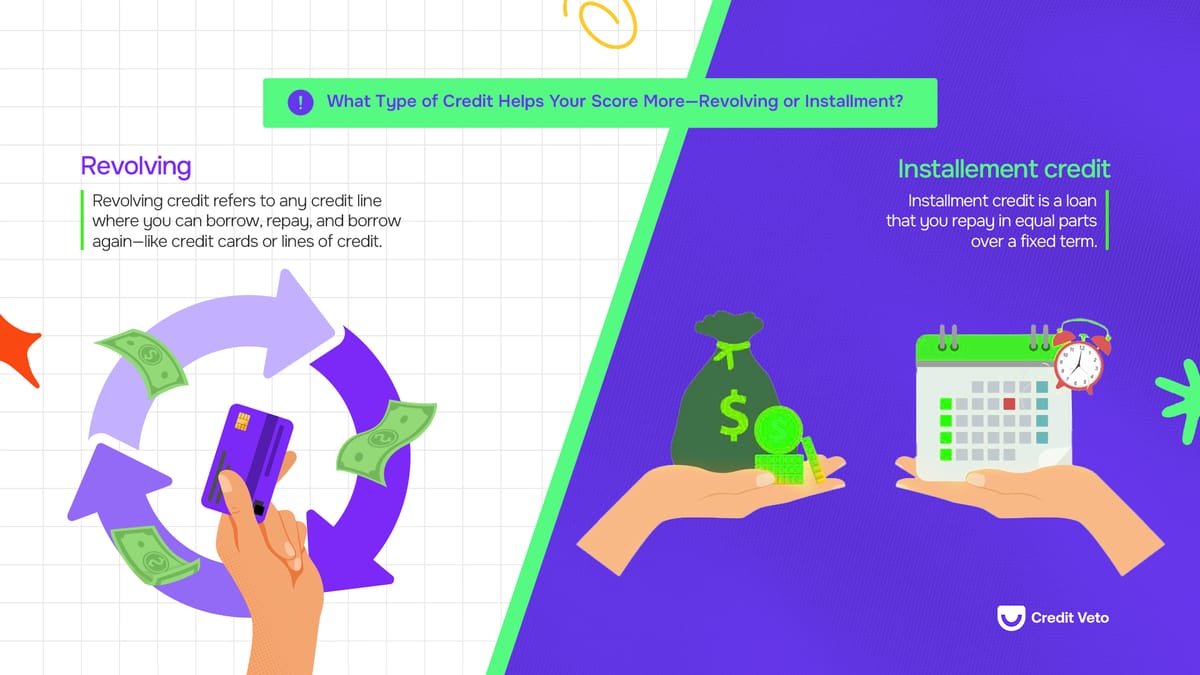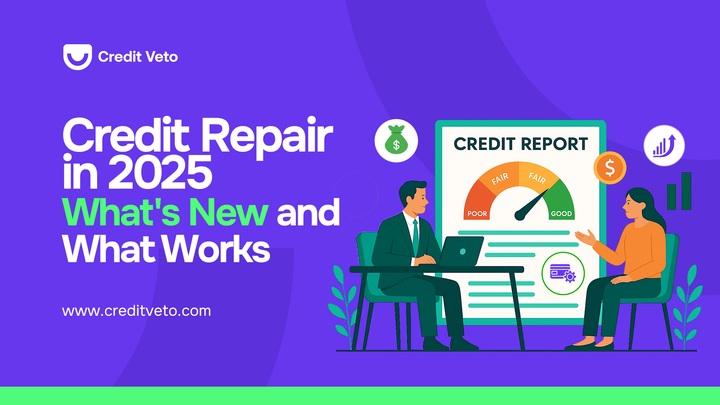While both are important, revolving credit has a stronger influence on your FICO score, primarily due to credit utilization and payment history. Learn how each affects your credit profile.
Picture this: You’re paying your bills on time; your balances are low; yet, your credit score just won’t budge. Sound familiar? You are not alone, but you must understand that a strong credit profile is built on a mix of credit types. Which has a greater impact—revolving credit or installment credit?
One of the most overlooked factors in your credit profile is your credit mix—and more specifically, the types of credit you’re using. Lenders and credit scoring models consider the diversity of your credit mix, which makes up 10% of your FICO score.
But how do installment loans vs. revolving credit impact your creditworthiness? In this article, we will show you how each affects your score, which type matters more depending on your situation, and how to build a healthy mix for faster credit growth.
What Is Revolving Credit?
Revolving credit refers to any credit line where you can borrow, repay, and borrow again—like credit cards or lines of credit. It is an open-ended credit line that does not have a fixed repayment term. Borrowers can use, repay, and reuse the credit as long as they stay within their limit.
Examples of Revolving Credit:
- Credit cards (Visa, Mastercard, Amex, etc.)
- Home equity lines of credit (HELOCs)
- Retail store cards
- Personal lines of credit
How It Works:
- You are assigned a credit limit (e.g., $5,000).
- You can spend up to this limit and make payments as needed.
- Your available credit fluctuates based on payments and spending.
- You make flexible monthly payments (usually with a minimum due)
- Interest applies if you carry a balance beyond the billing cycle.
- Your credit utilization (the percentage of your limit you're using) plays a major role in your score
What Is Installment Credit?
Installment credit is a closed-ended loan where you borrow a fixed amount and repay it in equal installments over a set period. Installment credit is a loan that you repay in equal parts over a fixed term.
Examples of Installment Credit:
- Mortgages (home loans)
- Auto loans
- Student loans
- Personal loans
- Payday loans (short-term installment loans)
Unlike revolving credit, you can’t reuse the credit once you repay it—it’s a one-time loan with scheduled payments.
How It Works:
- You receive a lump sum upfront (e.g., a $10,000 car loan).
- You make fixed monthly payments over a set loan term (e.g., 60 months).
- Payments include principal + interest.
- Once repaid, the loan is closed (no revolving balance).
How Does Revolving Credit Impact Your Score?
Revolving credit has a significant impact on your credit score, mainly through:
- Credit Utilization (30% of FICO Score)
High balances hurt your score. Experts recommend keeping credit utilization below 30%. Example: If your limit is $10,000, aim to use $3,000 or less at any time.
- Payment History (35% of FICO Score)
Missed credit card payments can severely damage your score. Consistently making on-time payments boosts creditworthiness.
- Account Age & Credit Mix (15% & 10% of FICO Score)
Keeping older credit cards open helps maintain a long credit history. Having both revolving and installment accounts strengthens your mix.
- New Credit Inquiries (10% of FICO Score)
Applying for multiple credit cards in a short period lowers your score.
- Credit Utilization (30% of FICO Score)
High balances hurt your score. Experts recommend keeping credit utilization below 30%. Example: If your limit is $10,000, aim to use $3,000 or less at any time.
- Payment History (35% of FICO Score)
Missed credit card payments can severely damage your score. Consistently making on-time payments boosts creditworthiness.
- Account Age & Credit Mix (15% & 10% of FICO Score)
Keeping older credit cards open helps maintain a long credit history. Having both revolving and installment accounts strengthens your mix.
- New Credit Inquiries (10% of FICO Score)
Applying for multiple credit cards in a short period lowers your score.
How Does Installment Credit Impact Your Score?
Installment loans impact your credit score differently:
- Consistent Payment History (35% of Score)
On-time loan payments help establish a strong repayment history. Late payments can remain on your report for 7 years.
- Credit Mix & Account Age (10% of Score)
A diverse mix of credit accounts (e.g., a mortgage + a credit card) boosts your score. Long-term loans (mortgages, student loans) improve credit age.
- Lower Impact on Utilization (30%)
Unlike credit cards, installment loans do not impact credit utilization. Example: A $20,000 car loan won’t count towards your revolving debt ratio.
Revolving vs. Installment Credit: Strengths and Risks
Here's a breakdown of how each supports your score differently in terms of strengths and risks:
If your goal is a quick boost, revolving credit offers more impact—if you manage your balance wisely. If you want long-term credit strength, installment credit builds trust over time.
Which Helps Your Score More: Revolving or Installment Credit?
The answer depends on how well you manage each type of credit.
Derived Verdict: Revolving Credit Has a Bigger Impact
While both types of credit are important, revolving credit has a stronger influence on your FICO score, primarily due to credit utilization and payment history.
- If you want to boost your credit score quickly, focus on lowering your credit card balances and making consistent on-time payments.
- If you want long-term credit growth, maintaining a mix of installment and revolving accounts is ideal.
Why Credit Mix Matters
Your credit mix (types of credit accounts) makes up 10% of your credit score, according to FICO. While that might seem small, it can be the deciding factor when you’re trying to break through from fair to good credit or from good to excellent.
Example:
- Someone with only credit cards may be penalized for lacking variety
- Someone with only loans may be seen as unproven in managing flexible credit
Having at least one installment and one revolving account demonstrates well-rounded financial responsibility.
How to Build a Healthy Credit Mix (Safely)
If your credit mix is working against you, don’t worry—you can improve it without taking unnecessary risks.
1. If You Lack Revolving Credit
- Apply for a secured credit card (low risk)
- Keep credit utilization below 10%
- Set up auto-payments to avoid late payments
2. If You Lack Installment Credit
- Consider a credit-builder loan or small personal loan
- Repay it on time over 6–12 months
- Even a $300 credit-builder loan helps build your file
3. Monitor Your Mix
By now, you should know that credit monitoring is a must when it comes to building and maintaining your credit health. Use Credit Veto’s credit monitoring services to:
- Track your utilization in real time
- See how your credit mix is reported
- Get notified of new accounts, inquiries, and payment activity
Not sure where your credit mix stands? Start tracking with Credit Veto. Our credit monitoring service gives you a full snapshot of your score, account types, payment history, and what’s impacting your credit the most—plus alerts to help you stay ahead.
Mistakes to Avoid with Revolving or Installment Credit
- Maxing out cards: This tanks your utilization ratio
- Only having one type of credit: Limits your credit profile depth
- Closing old credit cards: This reduces credit age and revolving availability
- Missing a loan payment: Installment credit is all about reliability—don’t mess it up.
FAQs
1. Is a credit card installment or revolving credit?
A credit card is revolving credit. You can carry a balance, pay it off, and reuse the available credit.
2. Is a mortgage installment or revolving credit?
A mortgage is an installment loan because it has fixed monthly payments over a set term.
3. What is an example of revolving credit?
Common examples include credit cards, retail store cards, and HELOCs.
4. Is a payday loan an installment or revolving credit?
A payday loan is an installment loan because it is repaid in fixed amounts over a short term.
5. Does a small business loan count as installment or revolving credit?
It depends on the loan type. A business credit card is revolving credit, while a business term loan is installment credit.
How Credit Veto Can Help You Build Better Credit
Understanding the difference between revolving and installment credit is the first step to improving your credit health. However, managing these accounts effectively is where many struggle.
- At Credit Veto, we provide credit monitoring, dispute resolution, and expert guidance to help you:
- Track your credit with real-time updates.
- Fix errors on your credit report that could be lowering your score.
- Strengthen your credit profile to qualify for better financial opportunities.
The Bottom Line
Both installment and revolving credit play an essential role in your credit score. While installment loans build long-term credit strength, revolving credit has a more immediate impact on your score due to credit utilization and payment history.
If you’re looking to increase your credit score fast, managing your credit card balances and making timely payments is key. But maintaining a healthy mix of both credit types ensures long-term credit success.
By staying proactive with your credit, you can unlock better financial opportunities, lower interest rates, and greater borrowing power. Start optimizing your credit the smart way by signing up with Credit Veto today.





Comments ()